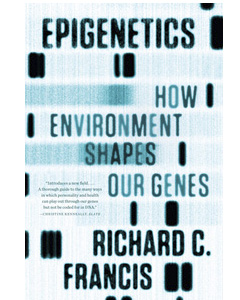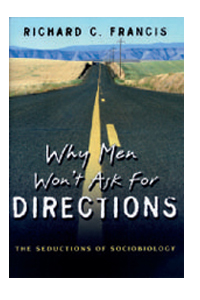Epigenetics: How Environment Shapes Our Genes
 Epigenetic means “on the gene,” and the term refers to the recent discovery that stress in the environment can impact an individual’s physiology so deeply that those biological scars are actually inherited by the next several generations. For instance, a recent study has shown that men who started smoking before puberty caused their sons to have significantly higher rates of obesity. And obesity is just the tip of the iceberg—many researchers believe that epigenetics holds the key to understanding cancer, Alzheimer’s, schizophrenia, autism, and diabetes. Epigenetics is the first book for general readers on this fascinating and important topic. The book is driven by stories such as the Dutch famine of World War II, José Canseco and steroids, the breeding of mules and hinnies, Tazmanian devils and contagious cancer, and more. This smart accesible book on a key twenty-first-century topic is must-have information for every well-informed citizen.
Epigenetic means “on the gene,” and the term refers to the recent discovery that stress in the environment can impact an individual’s physiology so deeply that those biological scars are actually inherited by the next several generations. For instance, a recent study has shown that men who started smoking before puberty caused their sons to have significantly higher rates of obesity. And obesity is just the tip of the iceberg—many researchers believe that epigenetics holds the key to understanding cancer, Alzheimer’s, schizophrenia, autism, and diabetes. Epigenetics is the first book for general readers on this fascinating and important topic. The book is driven by stories such as the Dutch famine of World War II, José Canseco and steroids, the breeding of mules and hinnies, Tazmanian devils and contagious cancer, and more. This smart accesible book on a key twenty-first-century topic is must-have information for every well-informed citizen.
PRAISE
“Mesmerizing stuff…Richard Francis provides an excellent non-technical introduction to the scientific underpinnings of this discomfiting new genetics…He reviews the literature on the epigenetics causes of obesity, neurological disorders, and stress.” Judith Shulvitz, New Replublic
“Epigenetics explains [the science] in clear, no-nonsense prose…One particularly excellent chapter explains epigenetic changes through the body of steroid-addled baseball player José Canseco, from his brain to his testicles.” Josh Rothman, Boston Globe
“A guided tour of this mysterious new landscape…It’s not often that you find José Canseco, mouse mothers, Dutch famine victims, sea urchins, identical twins and Tasmanian Devils all in the same book, but you will here…Francis hits the highlights.” Tina Hesman Saey, Science News
“Francis’ thoughtful and succinct book focuses on the narrative and the excitement of discovery…A seasoned science writer, Francis is at his best when describing abstract concepts in a historical context.” Jonathan Weitzman, Nature
“The potential is staggering. . . . The age of epigenetics has arrived.”—Time, January 2010
“ In a style that is clear and stimulating but never patronizing, Richard Francis provides an intelligent, readable, and enjoyable account of how epigenetics helps us construct our nature and influence our heredity. Using fascinating examples and case studies, Francis brings to life this new and exciting field of biological and medical research, which alters the way we need to think about our past and our future.”–Eva Jablonka, Tel Aviv University, coauthor of Evolution in Four Dimensions
“By way of wonderful stories from everyday-and not so everyday-life, Francis acquaints the reader with the fascinating world on, above, and around the genes. This is an excellent and extremely enjoyable introduction to the important science of epigenetics.”—Oren Harman, Author of The Price of Altruism: George Price and the Search for the Origins of Kindness
BUY NOW | AMAZON | BARNES & NOBLE | INDIEBOUND | POWELLS
Why Men Won’t Ask for Directions
 Much of the evolutionary biology that has grabbed headlines in recent years has sprung from the efforts of sociobiologists and evolutionary psychologists to explain sexual features and behavior–even differences between how men and women think–as evolutionary adaptations. They have looked to the forces of natural selection to explain everything from the mimicry of male mockingbirds to female orgasms among humans. In this controversial book, Richard Francis argues that the utility of this approach is greatly exaggerated. He proposes instead a powerful alternative rooted in the latest findings in evolutionary biology as well as research on the workings of our brains, genes, and hormones.
Much of the evolutionary biology that has grabbed headlines in recent years has sprung from the efforts of sociobiologists and evolutionary psychologists to explain sexual features and behavior–even differences between how men and women think–as evolutionary adaptations. They have looked to the forces of natural selection to explain everything from the mimicry of male mockingbirds to female orgasms among humans. In this controversial book, Richard Francis argues that the utility of this approach is greatly exaggerated. He proposes instead a powerful alternative rooted in the latest findings in evolutionary biology as well as research on the workings of our brains, genes, and hormones.
Exploring various sexual phenomena, Francis exposes fundamental defects in sociobiology and evolutionary psychology, which he traces to their misguided emphasis on “why” questions at the expense of “how” questions. Francis contends that this preoccupation with “why” questions (such as, “Why won’t men ask for directions”?) results in a paranoiac mindset and distorted evolutionary explanations. His alternative framework entails a broader conception of what constitutes an evolutionary explanation, one in which both evolutionary history, as embodied in the tree of life, and developmental processes are brought to the foreground. This alternative framework is also better grounded in basic biology.
Deeply learned, consistently persuasive, and always engaging, this book is a welcome antidote to simplistic sociobiological exegeses of animal and human behavior.
PRAISE
“Interesting, engagingly written, and important. Francis is rightfully attacking the theological/ideological basis of adaptationist thinking.”–James L. Gould, Princeton University
“A synthesis of the latest advances in the behavior, physiology and ecology of sociosexual behaviors, Francis’s book focuses primarily on animals, but also develops and critiques the history and present state of how this material has been applied (and misapplied) to the human condition. There are no books quite like this, and the general reader will be enlightened and enlivened.”–David P. Crews, University of Texas
BUY NOW | AMAZON | BARNES & NOBLE | INDIEBOUND | POWELLS